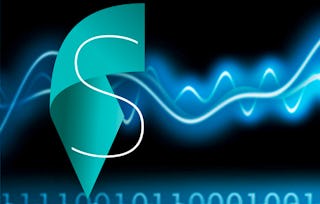Digital Signal Processing is the branch of engineering that, in the space of just a few decades, has enabled unprecedented levels of interpersonal communication and of on-demand entertainment. By reworking the principles of electronics, telecommunication and computer science into a unifying paradigm, DSP is a the heart of the digital revolution that brought us CDs, DVDs, MP3 players, mobile phones and countless other devices.

Digital Signal Processing 2: Filtering

Digital Signal Processing 2: Filtering
This course is part of Digital Signal Processing Specialization


Instructors: Paolo Prandoni
Access provided by Coursera Learning Team
19,929 already enrolled
195 reviews
What you'll learn
Digital filters, how they work
Digital filter design
Adaptive signal processing
Skills you'll gain
Details to know

Add to your LinkedIn profile
3 assignments
See how employees at top companies are mastering in-demand skills

Build your subject-matter expertise
- Learn new concepts from industry experts
- Gain a foundational understanding of a subject or tool
- Develop job-relevant skills with hands-on projects
- Earn a shareable career certificate

There are 3 modules in this course
How digital filters work in time and in frequency.
What's included
13 videos12 readings1 assignment2 ungraded labs1 plugin
Learning how to choose and design the right filter using the z-transform and numerical tools.
What's included
13 videos11 readings1 assignment2 ungraded labs1 plugin
Analyzing and processing random signals and designing filters that adapt to unknown inputs.
What's included
8 videos6 readings1 assignment1 ungraded lab1 plugin
Earn a career certificate
Add this credential to your LinkedIn profile, resume, or CV. Share it on social media and in your performance review.
Instructors

Offered by
Why people choose Coursera for their career

Felipe M.

Jennifer J.

Larry W.

Chaitanya A.
Learner reviews
- 5 stars
80%
- 4 stars
12.30%
- 3 stars
4.10%
- 2 stars
2.05%
- 1 star
1.53%
Showing 3 of 195
Reviewed on Sep 4, 2020
Add some numerical problems and solve them in your video lectures for the better understanding of concepts.
Reviewed on Oct 7, 2020
Best material on Signal Processing. Instructors emphasized on concepts. This course is enjoyable
Reviewed on Nov 27, 2020
This is a really good course that has very good exercises
Explore more from Physical Science and Engineering

École Polytechnique Fédérale de Lausanne

École Polytechnique Fédérale de Lausanne

École Polytechnique Fédérale de Lausanne

